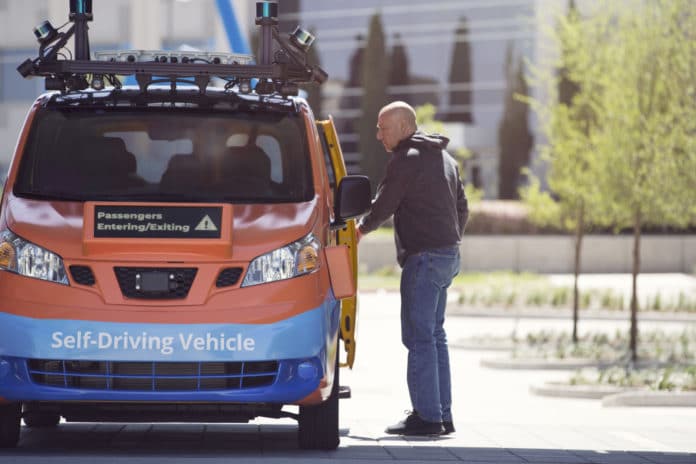You won’t have to go to California to see the latest on-demand self-driving technology. Just head down the road to Frisco.
Drive.ai, the City of Frisco and local partners announced on May 7 that they will launch the first on-demand self-driving transportation service in Texas, beginning in July.
Working in cooperation with the Frisco Transportation Management Association (TMA), Drive.ai will offer rides to over 10,000 people in self-driving vehicles within a geofenced area consisting of retail, entertainment and office space.
The pilot will run for six months, beginning with fixed pickup and drop-off locations around two large developments – HALL Park and The Star – and with planned expansion into Frisco Station.
“Frisco is recognized as a leader in using ‘smart,’ innovative traffic technologies,” said Frisco Mayor Jeff Cheney. “Drive.ai’s autonomous vehicles will help people get around one of our most vibrant commercial areas along Frisco’s North Platinum Corridor. We applaud the collaboration of the Denton County Transportation Authority, as well as our private partners at HALL Park, Frisco Station and The Star, which gave the green light, so to speak, to this pioneering pilot program. Today definitely marks a mobility milestone for our entire region. It also gets us closer to achieving one of our council’s ‘Top Ten’ goals, which is to improve traffic throughout Frisco, one of the fastest growing cities in the country.”
Drive.ai is based in Mountain View, California. Its self-driving on-demand service will be operated in conjunction with Frisco TMA, a public-private partnership organized to provide last-mile transportation options Frisco.
The Frisco TMA includes the City of Frisco, HALL Group, Frisco Station Partners, The Star and the Denton County Transportation Authority, which will administer the program.
Leading up to the July launch date, office employees, residents and patrons of these partners’ Frisco developments will gradually try out the program, gaining access to Drive.ai’s ride-hailing smartphone app. Once the program is live, riders can use the app to hail free rides in self-driving cars that connect to popular destinations.
Signage will be placed throughout the route, the vehicles will be painted a highly visible orange, and they will feature four external screens that communicate the vehicles’ intended actions to pedestrians and drivers on the roads.
“Self-driving cars are here and can improve the way we live right now,” said Sameep Tandon, co-founder and CEO of Drive.ai. “Our technology is safe, smart and adaptive, and we are ready to work with governments and businesses to solve their transportation needs. Working with the City of Frisco and Frisco TMA, this pilot program will take people to the places they want to go and transform the way they experience transportation.”
Drive.ai was founded in 2015 by graduate students from Stanford University’s Artificial Intelligence Lab. It has over 100 employees, with locations in Mountain View and Frisco. Drive.ai has raised about $77 million in funding, including a $15 million investment in September from Grab, a rival to Uber based in Asia.
There is some debate among researchers as to what impact driverless vehicles will have on energy use. Some say it will be less because transportation will be more efficient, but others point to the energy used for the computing power required to make the systems effective and safe.
Frisco is not the only city to test driverless vehicles. Last June, Arlington began using two driverless shuttles in its Entertainment district. The 12-passenger shuttles will be part of a test of driverless technology in the area.
Arlington Mayor Jeff Williams has touted driverless vehicles as a more cost-effective mass transit option for the future than light rail. With limited mass transit options, Williams said, driverless vehicles could benefit Arlington when the technology advances.






